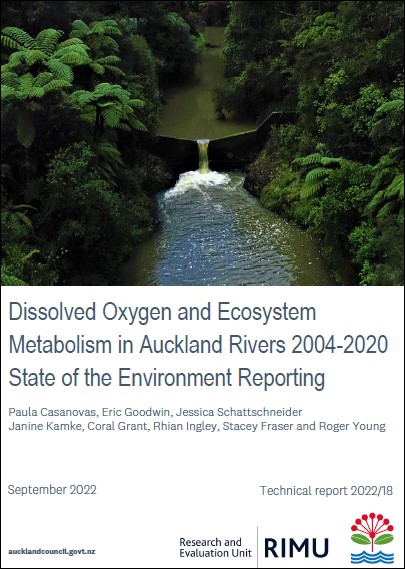Dissolved oxygen and ecosystem metabolism in Auckland rivers 2004-2020. State of the environment
Author:
Paula Casanovas, Eric Goodwin, Jessica Schattschneider, Janine Kamke, Coral Grant, Rhian Ingley, Stacey Fraser, Roger Young, Cawthron InstituteSource:
Auckland Council Research and Evaluation Unit, RIMUPublication date:
2022Topics:
EnvironmentFrom the Executive summary:
As part of its State of the Environment programme, Auckland Council has been monitoring dissolved oxygen (DO) continuously at 15 rivers for up to 17 years. This is the longest continuous DO dataset that we are aware of in New Zealand. DO is a critical water quality indicator and one of the action planning attributes in the National Policy Statement for Freshwater Management 2020 (NPS-FM 2020). There is now broad recognition that measuring water quality alone is not enough to assess river ecosystem health. A biophysical framework for river ecosystem health was included in the NPS-FM 2020 and incorporates five components — water quality, water quantity, habitat, aquatic life and ecological processes. Ecosystem metabolism (the combination of gross primary production (GPP) and ecosystem respiration (ER)) is an example of an ecological process indicator and was included as an attribute in the NPS-FM 2020. Continuous DO data are used to calculate ecosystem metabolism, so there are multiple benefits from measuring DO continuously.
This study is the latest analysis and reporting of DO data and ecosystem metabolism estimations for rivers in the Auckland region. Ecosystem metabolism was calculated using R code enabling the entire dataset to be examined, rather than just focusing on short representative ‘snapshot’ periods of the dataset which was the only feasible approach previously when metabolism calculation was a more manual process. We report DO minima values in relation to the NPS-FM attribute table and provide similar reporting for ecosystem metabolism, although a banding system for ecosystem metabolism has not yet been incorporated into the NPS-FM 2020. We also examine temporal and spatial variability in ecosystem metabolism and potential drivers of this variability. ...
Auckland Council technical report, TR2022/18
